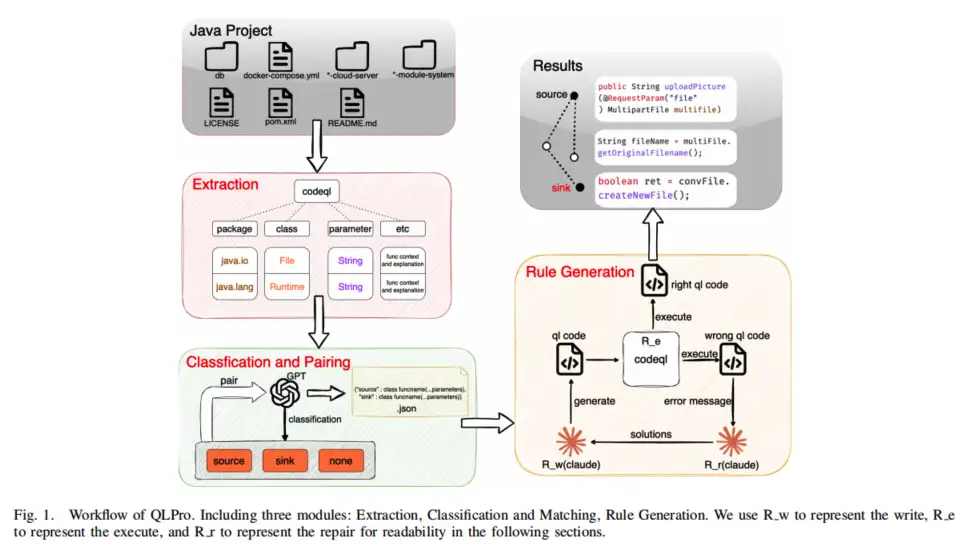Penligent.ai: Rethinking Automated Vulnerability Discovery with LLM-Powered Static Analysis

PenligentAI · 15, July 2025
For years, security professionals have depended on painstaking manual code reviews and standard static analysis tools to uncover vulnerabilities. Now, leveraging groundbreaking research like QLPro—which merges large language models (LLMs) with static code analysis for full automation—Penligent.ai emerges as an all-in-one, production-ready platform. With Penligent.ai, both security experts and everyday engineers can rapidly and precisely surface intricate vulnerabilities, all with maximum automation.
A New Paradigm: LLMs + Static Analysis
The QLPro paper (Hu et al., 2025) highlights a core security reality: While traditional static analysis tools such as CodeQL are competent rule-based scanners, they fall short when projects demand customization or when facing novel vulnerabilities. LLMs, on the other hand, offer superior code comprehension and generation but struggle with the nuances of certain programming grammars and rich code contexts. Penligent.ai bridges that divide—pairing advanced LLMs with top-tier taint tracking and symbolic execution engines for a fundamentally smarter, more adaptable solution.
What Powers Penligent.ai
Taking inspiration from frameworks like QLPro, Penligent.ai productizes these research advances into concrete features:
- Automated Extraction and Classification: Through deep API and code graph analysis, Penligent.ai identifies high-risk data sources, sinks, and cleaning routines—across multiple programming languages.
- Semantic, Context-Aware Matching: Security-tuned language models enable Penligent.ai to classify APIs and intelligently map real (source, sink) chains, minimizing dependence on hand-written expert rules.
- Multi-Context Voting: To counter the risk of misclassification in large projects (an issue flagged in QLPro research), Penligent.ai adopts context sharding and LLM-driven multi-round voting, boosting both accuracy and coverage.
- Iterative Rule Generation and Repair: Adapting QLPro’s triple-role model (Writer, Executor, Repairer), Penligent.ai delivers a robust “generate–test–fix” loop, ensuring each rule is accurate, compatible, and ready to catch bugs in real scenarios.
Automated Vulnerability Discovery for All
Penligent.ai makes advanced code security accessible:
Legacy static tools place a heavy manual burden on security specialists, often leaving regular devs out of the process. With its adaptive LLM backbone, Penligent.ai lets even non-experts launch smart, context-aware scans with a single click.
In Practice:
- On benchmarks comparable to QLPro’s JavaTest suite, Penligent.ai consistently uncovers a wider array of known vulnerabilities—including multiple 0-days—outshining baseline CodeQL and traditional rule sets.
- Generated detection rules rate >90% in syntax correctness and validated bug signals, with rich reporting that takes teams from detection to detailed remediation steps.
Feature Comparison
| Feature | Traditional Static Analysis | LLM+Static Hybrid (Penligent.ai) |
| Rule Generation | Manual, static | Automated, context-driven |
| 0-day Vulnerability Coverage | Rely on experts, uncommon | High, thanks to semantic reasoning |
| Syntax Adaptation | Rigid, project-limited | Multi-stage, LLM-powered self-repair |
| Usability | Security professionals | Developers and non-specialists |
| Maintenance | Hand-edited, ongoing | Self-validating, automatic |
Data reference: QLPro (Hu et al., 2025) and Penligent.ai internal evaluation.

Responsible Innovation for Enterprise-Grade Security
Penligent.ai is built with an unwavering focus on ethical, responsible vulnerability discovery. The platform incorporates strong user authentication, full audit trails, and enterprise-grade access controls. Every detected issue maps clearly to a verified vulnerability (CVE) or a thoroughly reproducible technical report—empowering development and compliance teams alike.
Penligent.ai signals a new era in automated security: It fuses large language models, static analysis, and end-to-end automation, breaking the limits of traditional tools and putting once-expert-only capabilities in the hands of any modern development team.
Further Reading & Sources:
- “QLPro: Automated Code Vulnerability Discovery via LLM and Static Code Analysis Integration” (Hu et al., 2025)
- Wired: AI and Penetration Testing
Copyright Notice: This feature draws on open research and Penligent.ai technical documentation and is intended to advance awareness of cutting-edge security automation. Any misuse is strictly prohibited.
Contact: For partnership or deeper technical discussion, visit penligent.ai or email [email protected]
Relevant Resources